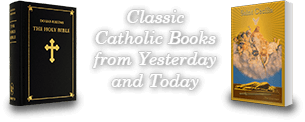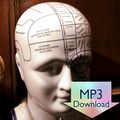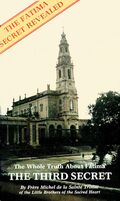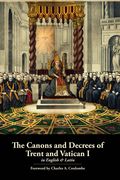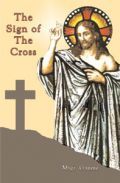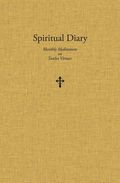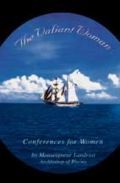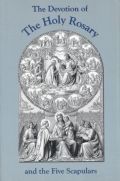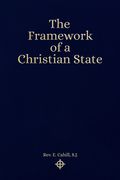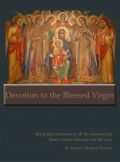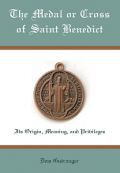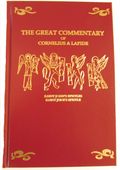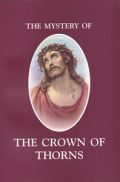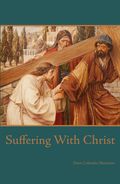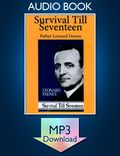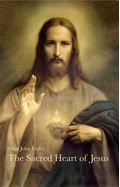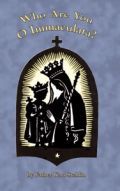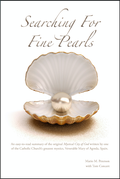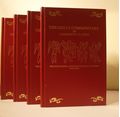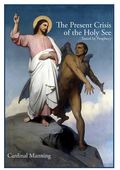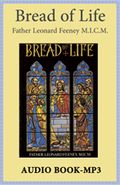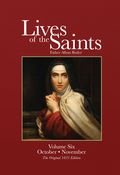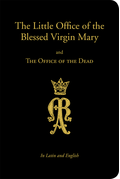Categories
Information
All Products
by Frère Michel de la Sainte Trinité - Complete set
This 3 volume set is no longer in print. Because of their imortant and irreplaceable historic value we are offering them as FREE PDF downloads as a service to our customers. Please click here for the free download.
Vol. ! Science and the Facts - 560 pages PDF
Vol. II The Secret and the Church - 860 pages PDF
Vol. III - The Third Secret - 870 pages PDF
The entire extraordinary mystery of Fatima, studied step by step from the beginning; for our conversion and our salutary consecration to the Immaculate Heart of Mary; so as to arrive at the discovery of the Secret of secrets, the third part of the secret given by the Blessed Virgin Mary on July 13, 1917, which is still hidden at Rome; and to put an end to our fears, for there is a victorious, glorious conclusion to this era of errors, carnage and persecutions spread all over the world by Russia as Mary, and She alone, had announced in 1917.
Let us go forward, then, for we shall see the salvation which only the Immaculate Heart of Mary could promise and will obtain from Jesus for us!
Volumes II and III are also available:
Vol. II - The Secret and the Church (1917-1942)
Vol. Ill - The Third Secret (1942-1960)
This three volume masterpiece was written by Frère Michel de la Sainte Trinité of the Little Brothers of the Sacred Heart under the direction of the late Abbé Georges deNantes. Frère Michel, after writing this masterppiece retired to the secluded life of the Cisterians, of which order he is now the Superior.
This work is of great historical significance since it it the history of the dark ages of the 20th century, the most backward, cruel, and barbaric of all centuries in the Chirstian era. It is a story however, full of hope and great beauty because it is the story of our age as God sees it. No Catholic or historian can afford to pass up the chance to read this entire work if he would understand the passion of our age and the years to follow.
The Canons and Decrees of Trent and Vatican I - In Latin and English - PB 170 pages
Here you will find all of the essential documents and infallible teachings of these two modern councils of the Catholic Church. They are beautifully laid out in a two-column format with large readable fonts of both the original Latin and Cardinal Manning's English translation side by side.
Foreword
To say that the Catholic world is in a state of doctrinal confusion today would be an almost comical understatement, were not the issues involved—the individual salvation or damnation of every man, woman, and child on the planet—so important. Despite the wealth of defined dogmatic teaching that the Church has produced over twenty centuries, the actions of many prelates, priests, and theologians (some in the highest reaches of the hierarchy) have obscured the truths of the Faith for many, if not most, Catholics and non-Catholics.
This has happened before. In the 16th century, the successive revolts of Martin Luther, John Calvin, and Henry VIII and their brethren, together with pre-existing abuses and doctrinal questions that opened the door for their defections, created an enormous amount of confusion in the Church. All areas of Catholic life—pastoral, devotional, and liturgical—suffered. As kings and princes began to create their own state churches and enforce membership in these fake churches on their hapless subjects, Pope Paul III (1534–1549) decided, in concert with Holy Roman Emperor Charles V, that the time had come to call a new Ecumenical Council. This was slated to air Protestant complaints, reform Catholic practices, define or redefine disputed dogmas, and reconcile Christian princes, with a view to uniting Christendom and reviving the Crusades. Pope and Emperor agreed that it would convene at Mantua on May 23, 1537. Renewed war broke out between the Emperor and the French, thus delaying the opening. Two years of delays led the Pope to cancel the whole process.
Emperor Charles V, however, was very keen on the idea, and on December 13, 1545, the Council at last convened at the city of Trent. The seat of a Prince-Archbishopric of the Holy Roman Empire, it was Charles’ choice for the Council’s location. During the next few years in eighteen sessions, doctrinal decrees would be issued on the Holy Scriptures, Original sin, Justification, the Sacraments in general, Baptism, and Confirmation. An outbreak of the plague and various other things, including Paul III’s death, led to the Council being prorogued indefinitely on September 17, 1549.
The new Pope, Julius III (1550–1555), agreed with Charles V that there should be no further delay. The Council Fathers gathered at Trent on May 1, 1551. The Emperor and Pope concurred that the Protestants should appear at the Council and present their case—although without being able to vote. Although some of the Reformers did set out for the Council, in the end none appeared because of their inability to vote. Nonetheless, important work was done, and decrees defining Catholic teaching on the Holy Eucharist, Penance, and Extreme Unction were passed by the delegates. Unfortunately, at this juncture, the Emperor’s war against the Protestants took a turn for the worse, and Maurice, the Elector of Saxony invaded Tyrol. The Council was broken up by the threat on April 28, 1552. As Julius III retreated ever more into his strange interests, the prospect of reconvening the Council receded, while his successor, the stern reformer Paul IV, had other fish to fry in clearing out from Rome the moral detritus left by Julius. Moreover, Charles V had abdicated in 1555; his brother and successor as Holy Roman Emperor, Ferdinand I, was not as interested in Council as his brother had been—at least initially.
Pius IV (1559-1565) was determined that the council should be reopened and brought to a successful conclusion. From January 18, 1562 to December 4, 1563, the Council met at Santa Maria Maggiore, and continued until its final adjournment on 4 December 1563. The final doctrinal decrees were on Matrimony; Cults of Saints, Relics, and Images; and at last the very topic that had excited Luther so much way back in 1517: Indulgences. The documents were signed at last by 255 Council Fathers, and the bull of ratification was published by the Pope on January 26, 1564.
The Council had asked the Pope to continue its work by publishing definitive versions of a catechism based upon its decrees; shepherded through by Pius IV’s nephew, St. Charles Borromeo, this appeared in 1566, and remains today as the most clear, unambiguous, and authoritative catechism in print. Having appeared under St. Pius V, the catechism was soon joined by revisions of the Breviary and Missal, the latter of which remained substantially unchanged until the mid-20th century.
Almost two centuries later in the 18th century, the Catholic world had changed considerably. On the one hand, Latin America, the Philippines, and various other new regions had been added to the Church; but on the other Protestantism had solidified into its own bloc of nations, the Enlightenment and the French and succeeding Revolutions had toppled Monarchs, and there was no more Holy Roman Emperor. Scientism and Socialism were sapping the faith even of Catholics—and the supposedly Catholic government of the new Italian Kingdom was struggling with the Papacy for control of the remainder of the Papal States. At any moment, Bl. Pope Pius IX (1846-1878) faced an imminent invasion of his own capital, Rome.
The many struggles around the world between Catholics and governments intent on usurping the rights of the Church in various ways were at once symbolized by and subsumed into the one the Pope faced. This fact, combined with the spread of the telegraph, newspapers, and steamships put the Pope very much into the forefront of the Church’s worldwide struggle. The Ultramontanist party in every Catholic land called for the closest possible unity between the national Churches and the Holy See and with each other. In the face of all of this, Bl. Pope Pius IX convoked an Ecumenical Council, Vatican I.
Although they all refused in varying tones from polite to contemptuous, all of the Eastern Orthodox Patriarchs had been invited as full participants to the Council by the Pope as an attempt to end the Eastern Schism.
Opening on December 1869 at St. Peter’s Basilica rather than the Lateran (where the prior five councils in Rome had met) and adjourned on October, 20 1870, a month after the Italians at last conducted their long-threatened seizure of Rome, Vatican I accomplished far less than Trent. Nevertheless, it did deal definitively with two important matters. The first—the pretended clash between Faith and Reason, which Liberalism had pushed to the forefront of national life in so many countries—was dealt with in the Dogmatic Constitution on the Catholic Faith (Dei Filius). Far more controversial and hotly debated at the time was the dogma of Papal Infallibility, at last defined in the First Dogmatic Constitution on the Church of Christ (Pastor aeternus). The Council was then prorogued. It would not be officially concluded until the eve of Vatican II.
Much of course has changed since then. But what has not changed is the essential nature of these defining documents. Regardless of changes in technology, fashion, liturgy, or anything else, these pages contain the bare minimum of what it is to be Catholic: if one can read it all and agree with it all, he is a Catholic; if not, not. In the current period of confusion, a clear guide to spiritual reality such as this is utterly essential; we all owe a debt of gratitude to Loreto Publications for making it available.
Charles A. Coulombe
Trumau, Austria
Vigil of the Nativity of St. John the Baptist - 23 June 2022
The Council of Trent
Symbol of Faith - Canonical Scriptures - Original Sin - Justification, Sin, & Merit - The Sacraments in General - Baptism - Confirmation - The Eucharist - Penance - Extreme Unction - Communion: Under both Species & of Children - The Mass - Holy Orders - Matrimony - Purgatory - Relics - Indulgences - Profession of Faith
The Council of Vatican I
Dei Filius
Dogmatic Constitution on Faith - God the Creator - Revelation - Faith - Faith & Reason — Canons: God the Creator: Revelation: Faith: Faith & Reason
Pastor Æternus
The Church of Christ - Papal Primacy - Perpetual Papal Primacy - Nature of Papal Primacy - Papal Infallibility
Msgr. Gaumé - EBOOK - PDF
The holy Sign of the Cross is the most important prayer and symbol of our Christian faith. It is at once the image of Christ's passion, the sign of the redemption of all mankind, the awesome testament of the destruction of the power of the devil and of his kingdom on earth. The resurrection is the promise and seal and guarantee of eternal life which consummated the work of the Cross.
Christians rejoice and the demons tremble to see the Sign of the Cross emblazoned everywhere as proof of Christ's victory over the world. Christ said "all power is given to me in heaven and on earth" and the Cross is the seat of that power. There is no place on earth where a person who makes the Sign of the Cross is not immediately recognized as a Catholic, and there is no miracle that has not been worked under this sign. It is the "nuclear bomb" of prayers and with it the faithful can clear away all enemies and temptations with the simplest of wordless gestures. Msgr. Gaumé has compiled a magnificent collection of history and commentary from the saints and fathers and doctors, as well as his own meditations and exhortations regarding this most powerful prayer. All Catholics should avail themselves of this information and make it fruitful in their own lives.
Ebook (pdf, kindle, epub)
Introduction
Anonymously published in 1775, this book swept through the Catholic world and multiple editions were published in quick succession. It remained readily available to generations of Catholics in many languages. The author remains unknown to this day. In a brief preface to the 4th edition of 1778 the following advice was given:
“To draw the utmost profit from this volume, mere reading will not suffice. It must be read with calm reflection, deep thought, and ardent desire to translate into action whatever is found to be beneficial to the individual soul.”
Without a doubt, the Spiritual Diary is one of the most widely read works in ascetical literature. Over the centuries, countless souls have drawn part of their spiritual formation from meditation upon the saintly advice contained in these pages. Its collections of sayings and examples of saints provides a source of meditation for numerous devout souls.
The meditations are arranged for the calendar year with one of twelves virtues for each month. Perfection, Humility, Mortification, Patience, Meekness, Obedience, Simplicity, Diligence, Prayer, Confidence, Charity and Union are the virtues chosen, and under each virtue are gathered pertinent sayings and examples of the saints for every day of the month. A thought may be read daily, or the reader may prefer to read the different sections according to his spiritual needs.
Many have guessed that the writer was a devoteé of St. Alphonsus because of the pattern of the meditations and the numerous direct quotes from his writings. But other spiritual writers widely quoted are: St. Mary Magdalen diPazzi, St. Francis deSales, St. Vincent dePaul, and St. Theresa of Avila.
Whoever compiled this treasure house of advice has earned the lasting gratitude of Loreto’s editor who has used this book almost daily for over forty years. Since it has not been readily available to the general public since the last known edition from 1962, we have decided to issue this modern edition in the hopes that a new generation of 21st century Catholics may find as much spiritual benefit herein, as this editor has.
Douglas Bersaw - Editor
Feast of the Annunciation 2022
Monseigneur Landriot, Archbishop of Rheims, (Formerly Bishop of La Rochelle) - EBOOK - PDF
Translated from the French by Helena Lyons
Long out of print, this rare jewel is destined to become the favored spiritual guide for Catholic wives and mothers. Msgr. Landriot gave these conferences over 100 years ago, but they are as relevant to us today as the Gospels. This book is a guide for women who want to achieve sanctity in the home. Reading this book is the best thing you could do for your husband and children, as well as for yourself. This book was published to help women to raise and keep their families Catholic.
236 pages - EBOOK - PDF
The Redemptorist Father Michael Müller had a secret weapon which won him more converts than did his indefatigable preaching and writing: the holy rosary. This book was written as a thank you to the Mother of God for graces received. Not only does Father Müller explain what the rosary is, but what the rosary should be. After reading this devoted author, we assure you, you will never again say the rosary mechanically, or wear the scapular apathetically.
The Holy Rosary is a gift from the Blessed Virgin Mary, as are her powerful scapulars. This is the theme Father Michael Müller stresses throughout these two hundred and seventy-five pages of grateful acclamation to a devotion upon which the salvation of great multitudes of sinners rests. The heartfelt recitation of the Rosary and meditation on the mysteries thereof is the best “thank you” we can give to Mary for her unfathomable mercies. The scholarly author expounds upon every aspect of this devotion now over eight hundred years old. He relates it wonderfully to the New Testament as well as to the Old. Every single page of this pious work is replete with holy quotations or exciting analogies, inspiring anecdotes or miracles. And, too, there are enough actual accounts of graces spurned, or false, even superstitious devotion, to make us fearful. This is a book that the faithful will love so much that they will feel compelled to share their gift with wayward friends and relatives.
THIS BOOK IS BACKORDERED UNTIL SEPT. 5TH
FR. EDWARD CAHILL S.J.- Hardcover - 702 pages
The history of the modern world, since the French-Masonic Revolution, consists in the war to defend or to destroy the very ideals of Christian civilization. God's plan for men is that all of their societal structures, especially the government of their nation-states should be imbued with Catholic principles, and that Christ would be officially recognized by the state as king and ruler of the nation, that all of the laws of each state, would not only protect the freedom of His Church to operate freely among men for their salvation, but that further, each state would pattern its laws and government according the the social principles laid out by the Church for the happiness and freedom of mankind. But in the modern age, men have uncrowned Him as their King. This uncivilized age has cried out, like the Sanhedrin of old, "We will NOT have this Man rule over us." Thus, we are now quickly regressing into a new and very dark age of barbarism (with modern technology and weapons!) such as the world has never seen before.
Fr. Edward Cahill was an Irish Jesuit who founded "an Rioghacht", a group of Catholics focussed upon bringing the principles espoused in the papal encyclical Quas Primas (on the Kingship of Christ), to the modern world. This book is his masterpiece.
Fr. Denis Fahey C.S.Sp. - 226 pages - EBOOK as PDF, EPUB, or Kindle
“I repeatedly promised Saint Peter that if I ever got the chance, I would teach the truth about his Master in the way he and his successors, the Roman Pontiffs, wanted it done. That is what I have striven to do and am doing.”
—Rev. Denis Fahey
This is the last book published before Fr. Fahey’s death. It is an enduring testament to his love of the land and his firm belief that the best setting for most Catholic living is the family farm or small business, similar to the life lived by the Holy Family of Nazareth.
The Church is greatly interested in farming because it is the most fundamental of all human occupations. Those who work the land are deeply immersed in, and must work in harmony with, the natural rhythms and processes of God’s creative handiwork. The harmony and balance of rural life are profoundly upset by industrialized living, both on and off the land. Father delves into many spiritual, chemical, technical, and scientific questions pertaining to the future of farming and the life of the Church and all human society, which depends completely on the land for its existence and prosperity.
EBOOK - PDF
BEING THE SUBSTANCE OF ALL THE SERMONS FOR MARY’S FEASTS THROUGHOUT THE YEAR
By Bishop Jaques Benigne Bossuet
PB 164 pages
Translated by F. M. Capes
With an Introduction by Rev. William T. Gordon - Priest of the London Oratory
The great and learned Jacques Benigne Bossuet, Bishop of Meaux in France, was the author of many works, most prominent among them the Continuity of Religion, a compact history of the world from a Catholic perspective.
This book is a translation of his sermons given on all of the principal feasts of Our Lady throughout the year. His profound knowledge of the scriptures and his excellent theological training combined with a deep love for the Mother of God was productive of these powerful insights and thoughts about the
Theotokos.
From Bossuet’s teaching we learn that, to quote Cardinal Manning’s words, “the titles of honor given to Mary are not metaphors but truths—they express, not poetical or rhetorical ideas, but true and living relations between her and her Divine Son and between her and ourselves.”
EBOOK - PDF
Saint Benedict, father of western monasticism, is rather more known for his life and Rule than for a medal cast in his honor. The history of the image and the exorcism engraved on the medal, as well as the power of that Cross which the holy patriarch bears in his right hand, can be traced back to the eleventh century. Before he became Pope Saint Leo IX, one Bruno of Toul was cured of a mortal sickness after Saint Benedict appeared to him in the very guise we see depicted today on this sacramental. The Sisters of Charity under Saint Vincent de Paul also wore the blessed medal on their rosary. Abbot Gueranger, spiritual son of Saint Benedict, wrote this book to promote this very powerful devotion.
The unabridged commentary of Cornelius aLapidé on the Catholic Epistles of Saints John and Jude
EBOOK as PDF, EPUB, or Kindle
This is the 6th book in our series of the Great Commentaries of Cornelius aLapide S. J. The Four Gospels Commentary is listed elsewhere on this website and commentary on Galatians and Corinthians are also available. Those who have the Gospels Commentary already know what a treasure aLapide’s work is.
This volume perfectly matches the original four volume set and this is the first and only complete translation from Latin into English of these four Epistles. We are now working on a translation of more of aLapide's peerless commentary for future publication. Translation and publication in English of this 33 volume Latin magnum opus is continuing - first the rest of the New Testament and then the Old—God willing!
440 pages - $50. Hardcover $25.00 E-BOOK
Written by A Passionist - 400 Pages - EBOOK - PDF
Contemplating the Holy Face on the shroud of Turin, one sees a deep wound on the forehead of our Savior where one of the many thorns of His cruel crown punctured that very spot above His eyes where His members in the Church are marked who enter rightly into the penitential season of Lent. From the many figures of that spiny diadem in the Old Testament to the reality of the instrument of torture beaten into the head of the Son of God amidst insults and spittle, this terrible book, unforgettable in its endearing pathos, will surely help us to understand something of the true ugliness of sin and the awesome price the Just One had to pay in conquering it.
Abbot Dom Columba Marmion - PB– 280 Pages - EBOOK - PDF
Abbot Dom Columba Marmion was born in Dublin, in 1858, the year that our Lady appeared at Lourdes, and he died on January 30, 1923. That is the Feastday of Saint Martina, and it was also on January 30th that two other great founders died. It was January 30, 1875 that the Abbot of Solesmes, Dom Prosper Gueranger, passed to his eternal reward, and also, on the same day in 1978, that Father Leonard Feeney, who had a great devotion to both Abbots, departed from this vale of tears.
The substance of this book was gathered together by Dom Raymond Thibaut and originally published in 1941. The material was taken from the three great spiritual classics of Dom Marmion: Christ, the Life of the Soul, Christ in his Mysteries, and Christ, the Ideal of the Monk, all published shortly before his death.
Rarely will one find such great spiritual treasures as are contained herein, except from other masters of the spiritual life, such as St. Francis deSales or Saint John of the Cross.
EBOOK - PDF
Like Saint John the Apostle, Saint John Eudes had the privilege of what could be nothing less than direct intimate access to the Sacred Heart of Jesus and the Immaculate Heart of Mary. One can only conclude after reading this book on the Sacred Heart that here was more a seraph than a man, driven by the Holy Spirit to cast the fire of the Saviors love upon this earth with the pen of a scrivener lost in divine abandon. Surely, our Lord gave the key to the treasure house of His Heart to John Eudes. This book opens that treasure to the one with holy desires. God is wonderful in his saints, and with holy gusto we second the accolade given to him by a grateful generation: the wonder of his age.
Father Karl Stehlin, F. S. S. P. X. - EBOOK - PDF
Father Stehlin quotes extensively from Saint John Eudes, Cornelius a'Lapidé, Blessed Elizabeth of the Trinity, Saint Maximilian Kolbe, and Lucia of Fatima. This treatise is one of the most succinct and clear explanations of the complete economy of salvation ever penned. The full role of the Immaculata is explored and refined, and its relevance to the world in our time is detailed in an easy to read and understand format. This is militant Catholic theology made simple for this Marian age.
Mario Peterson & Tom Concert — 96 Pages - EBOOK - Kindle & EPUB
Searching for Fine Pearls is an easy-to-read summary of the monumental Catholic classic The Mystical City of God that was written by Venerable Mary of Agreda, a 17th century Franciscan abbess, who had mystical visions and revelations concerning many intimate details of the life of our Lord and his Blessed Mother not revealed in the Gospels. These revelations were described and published in four volumes, in Spanish, during her lifetime.
For those readers who might be daunted by the thought of reading the full work of over 2,000 pages, this short summary may encourage them to make the effort. Many saints, popes, religious, and other holy men and women, as well as humble laymen from all walks of life have found great grace and consolation in the pages of The Mystical City of God.
This work has received the approbation of seven popes and has been read and meditated upon by millions in the four centuries since its original publication. An English translation was produced in 1912 and has enjoyed a wide readership.
Mary of Agreda’s incorrupt remains and the well documented facts of her evangelizing bilocations to the New World attest to her holy life. Fray Junipero Serra, the founder of so many of the famous California missions, and a brilliant scholar and theologian, was profoundly influenced by her inspirational writings. He always carried with him three books; his breviary, a copy of the bible, and The Mystical City of God.
Cornelius a Lapide created a Scripture Commentary so complete and scholarly that it was practically the universal commentary in use by Catholics (often available only in 30 some Latin volumes) for hundreds of years. As part of the mission of Loreto Publications apostolate we have spent a lot of time and money over the last four years to produce a translation and design a beautiful edition of this priceless commentary so long hidden from the eyes of most Catholics. Now is your opportunity to own this masterpiece.
For an additional fee, customers can have access to an online version of the book. Detailed information and free samples are available from the online edition of a Lapide.
Note: If you have already purchased the books, and wish to purchase online access, contact us.
If you would like to purchase only the online edition ($40.00), you can do so here.
This set boasts the following features:
- Leather Covers & Satin Ribbons
- 2800+ Pages in Four Volumes
- Never Fully Translated Before
- Sewn Binding & Headbands
- First of over 30+ volumes to come
- A percentage of sales goes to further translations of other volumes
- Extensive discussion of Greek & Hebrew word meanings
Note: Customers ordering outside of the US should contact us to be notified of shipping rates.
By Cardinal Manning - 72 Pages - Small book Originally published in 1861
No, this book is not about current events. The book was written in 1861 by Cardinal Manning and dedicated to his good
friend John Henry Newman. It is a study of the prophecies in scripture and the comments and explanations given
by the Fathers and Doctors about the Great Apostacy and the preparation for the coming of the Antichrist. The great
Cardinal then comments on the prophecies relative to the circumstances of his times. This short but powerful treatise is
very much applicable to the 21st century as well as the mid-nineteenth.
“In the following pages I have endeavored, but for so great a subject most insufficiently, to show that what is passing in our times is the prelude of the anti-Christian period of the final dethronement of Christendom, and of the restoration of society without God in the world.”
With these words the great Cardinal Manning presents his study of the prophecies of scripture and the writings of the Fathers on the coming of the Great Apostacy and the advent of the Anti-Christ. No, this treatise was not written recently, but rather in 1861. Yet, it is about our times as well as his.
Richard Clarke, S.J. - 32 pages - EBOOK - PDF, Kindle, & EPUB
Patience, although neither the highest, nor the most fundamental virtue (those would be charity and humility) is first of all a first-fruit of humility and a bridge to charity. It is a first-fruit because those who are possessed of humility know the fragility of their own nature and accomplishments and how they are totally dependant upon God’s grace in all things and are therefore patient with their own failings. This leads to their learning how to be patient with other things, the so-called physical sufferings of life, and patient with others, since they know how to suffer patiently within themselves and for God, thus acting as a bridge to the fruitful practice of charity, the highest of virtues.
Patience and suffering go hand in hand, and since the most important work that we do in this life is to suffer well and in offering that suffering in union with the redemptive sufferings of Our Blessed Lord and his most Sorrowful Mother, patience—that which makes suffering rational, bearable, and fruitful—is one of the most important virtues to acquire and practice magnanimously.
Father Clarke makes this, and so much else clear and understandable in this short but potent explication of patience.
Butler's Original Lives - Vol. 6 - October & November - HC - 954 pages
Volume 6 of Butler’s Lives covers the months of October and November. Putting these invaluable books together in a new and modern format has been a joy for us. We hope that you are enjoying them. Vol. 6 at 954 pages is the largest. Some of the longest treatises are contained in it and these two months are very rich in the sanctoral cycle and full of famous saints.
A great man once said that “History is the laboratory of Wisdom.” And where do we find the best history? It is found in the lives of the saints, for it is through their lives on earth, lived within the union of Christ’s mystical body, the Catholic Church, that we see the only history that
truly matters for all eternity.
This spectacular history by Fr. Alban Butler, The Lives of the Saints, presents to the reader the life story of over 1600 saints and their times. In the original introduction we find this bold statement:
“It is on this account we have ventured to designate The Lives of the Saints an historical supplement to the
Old and New Testaments. We think this work deserves to be so considered, on account of the close resemblance it bears to the historical portions of holy writ. Let the divine economy, in this respect, be for a moment the subject of
the reader’s consideration.”
Loreto Publications has here reproduced the finest original edition of the text from the early 19th century with no modernization, alterations, deletions, or additions to the product of Father Butler.
Father Alban Butler was born in 1710, at Appletree, Northamptonshire, the second son of Simon Butler, Esq. Orphaned at the age of eight, he was sent to be educated at the English College, Douay, in France. In 1735, Butler was ordained a priest. At Douay, he was appointed professor of philosophy, and later professor of theology. It was at Douay, he began his principal work The Lives of the Fathers, Martyrs and Other Principal Saints. He also prepared material for Richard Challoner’s Memoirs of Missionary Priests, a work on the martyrs of the reign of Elizabeth. He labored for some time as a missionary priest in Staffordshire, and was finally appointed president of the English seminary at Saint Omer in France, where he remained till his death in 1773.
vitis Sanctorum
The Little Office of the Blessed Virgin Mary
The best prayer is the prayer of the Church. Here it is—simpler than the Breviary, but essentially the same. Pray the inspired psalms of the Holy Ghost. Around since the 8th century. Hated by heretics, loved by friends of Our Lady. Recited by Saints John Damascene, Catherine of Siena, Vincent Ferrer, Louis of France, Bridget of Sweden, and many more.
The text of the Little Office of the Blessed Virgin Mary and the Office of the Dead is that of the 1915 Benziger Brothers edition with updated punctuation and slight rewording of some familiar passages in English. The content of the Offices was revised in conformity with the norms of the typical edition of the Roman Breviary published in 1961.
Completely re-typeset with the Latin and English text on facing pages. Angelus Press offers this beautiful edition to the faithful as an eminently readable and truly affordable format.
264 pp. 4" x 6". Printed in red and black text. Gold foil stamped, black,flexible softcover with rounded corners.

